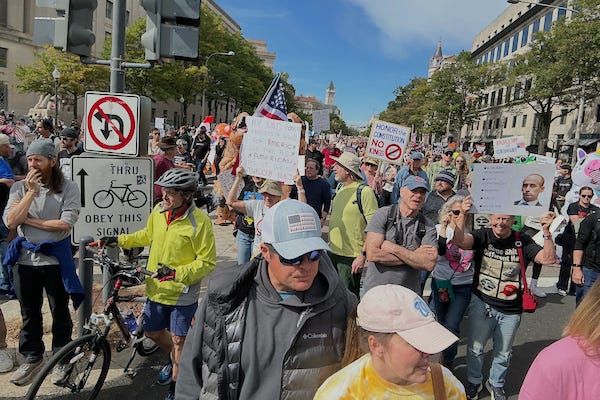22 Thoughts On No Kings DC
And on the street resistance writ large.
I’d originally intended to write this up immediately after the protest, when my memory was freshest, and send it out as a special edition or as Monday’s newsletter. But honestly it was so uneventful (laudatory) that it took me a while to process its meaning, and the larger context. So here, with a couple days to reflect, are some observations about the No Kings rallies in DC and across the country.
It was very big, but ironically the enormous national showing kept us well below potential. Plenty of people did of course metro in from Maryland and Virginia, and I know that a small number flew in to protest in the capital city. But No Kings events scattered across the Washington, DC, metro area and across the country cut down on commuter and fly-in protesters. As time goes on, I hope we’ll see at least a little consolidation, particularly nearer to New York and DC, so that media organizations have a harder time downplaying the news significance and the financial and political elites that prop up MAGA see more clearly how outnumbered they are.
I’m personally not cut out for protests. I don’t like starting chants, I don’t like participating in chants. Watching other people do those things makes me feel mortified for reasons I can’t really explain. In modern parlance, you can define the word “cringe” as “the things dorky, earnest people do when they feel uninhibited,” and rallies are breeding grounds for cringe.
I’d nevertheless resolved many weeks ago to attend the DC No Kings rally for reasons I laid out in Friday’s newsletter. Arresting this slide into fascism is the greatest calling in the lives of every American who recognizes and opposes what is happening. Plus, every few years or so, history in the making is weighty enough to want to lay eyes on it.
Among other events in the past 20 years, I’ve joined in a non-professional capacity as DC streets flooded for Barack Obama’s first election, his first inauguration, the recognition of same-sex marriage, the Women’s March, and Donald Trump’s defeat in 2020. This is the only one that felt like a civic duty.
If I hadn’t resolved to attend weeks ago, the orchestrated Republican blood libel of the No Kings movement would have negatively polarized me into protesting anyhow.
My subjective sense is that those GOP smears had people on edge about what might happen on the ground…right up until everyone arrived on Pennsylvania Ave. with their dogs, children, costumes, and signs. Over more than two hours I saw zero counter protesters or any tense moments of any kind.
My subjective sense (and the read of one of the top No Kings organizers) is also that the same smears convinced many people who might have taken a pass to show up as an act of defiance. Thank you to Mike Johnson et al for juicing turnout.
Official estimates suggest over seven-million people rallied across more than 2,500 protest sites. This is an important data point, but it doesn’t capture the scope of resistance, which (once you’re in it) is palpably larger.
If you think of the pro-democracy movement as concentric circles, the seven million who marched Saturday are at its center. One layer out are those who wanted to participate, but could not for one reason or another outside of their control (work, parenting, travel, illness, etc). Speaking anecdotally, we tried to round up a small group of people to walk down to Pennsylvania Ave. together, but about half of them were bogged down with other real commitments.
And then of course there’s the outermost circle of people who may never march in the streets but support the movement or oppose Trump or both. I am confident in asserting that the resistance comprises tens of millions of people.
The crowd in Washington was disproportionately old and white (and that’s good).
I don’t mean “good” in a normative sense. I mean it in the sense that American politics is a relentless and tedious battle to disarm a fickle middle, which itself is very white and old and laden with biases. A mass movement is not going to persuade Donald Trump and JD Vance and Stephen Miller to behave better. It can convince a durable majority that these bad men should face consequences for their conduct.


